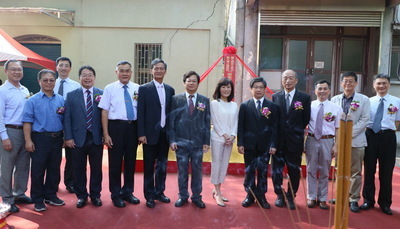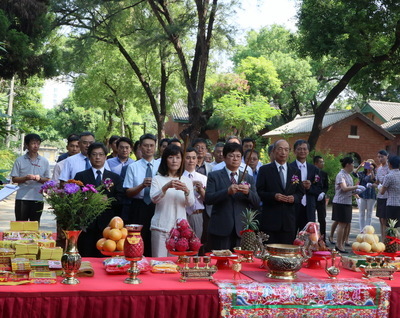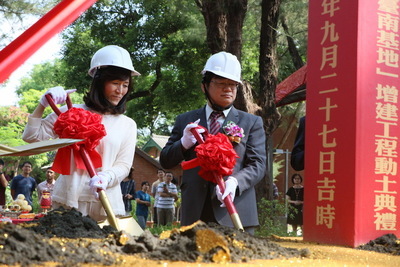NARLabs and NCKU builds Tainan base of operations for “Nanometer Chip Center” to Drive Economic Growth



In an effort to further the integration within interdisciplinary science and raise the energy behind Taiwan’s research and development of nanometer technology, the National Applied Research Laboratories (NARLabs) will collaborate with NCKU to build a Tainan base of operations for a “nanometer chip center” on NCKU’s Li-Hsing campus which will take up two buildings for a total of 900 ping. The center will feature specialized facilities to link up academia with industry, such as a high-spec semiconductor cleanroom, biomedical chip lab, and green technology demo area. Construction for the new center broke ground on September 27 and is slated to go into operation in 28 months. The center will promote technology service platforms such as “prospective low power-consumption high-speed sensory chips”, “next generation semiconductor manufacturing”, “advanced heterogeneous integration sealing”, and “advanced biomedical micro-fluid chips”.
The semiconductor manufacturing has pushed the limits of the physical realm. TSMC's first new 3nm process plant will be built in the Southern Taiwan Science Park. The field of derivative applications has grown, extending to the fields of biotechnology, artificial intelligence, smart manufacturing and the Internet of Things. In 2017, NCKU and NARLabs signed a contract to jointly establish the Tainan base of operations for the nanometer chip center. The two sides will combine their resources according to their respective strengths and specializations. In addition to investing in technological development in the fields of semiconductors, nanometer materials, and biomedical materials, the partnership also aims to guide Taiwan in transitioning to a new economic model by cultivating the high-level talent needed across the academia-industry line, and by deepening and expanding the connection between academia and industry in the north and south.
The groundbreaking ceremony was held at 9:00 am and was co-led by the president of NCKU Dr. Huey-Jen Jenny Su and the president of NARLabs Yeong-Her Wang. Other attendees include the chief secretary of the Ministry of Science and Technology Tsong Chyuan Chen, the deputy director-general of the Southern Tainan Science Park Bureau Chen-Kang Su, the vice president of the Office of Research Development at NTU Sun-Yuan Hsieh, the dean of the College of Engineering Woei-Shyan Lee, the dean of the College of Electrical Engineering and Computer Science Wei-Chou Hsu, the chairman of the board at Himax Dr. Biing-Seng Wu, and other distinguished guests. All attendees offered their well-wishes and heartfelt hopes for the smooth construction of the new center.
During Dr. Huey-Jen Jenny Su’s remarks at the ceremony, she made mention of NARLabs’ significant investment of resources into the construction of the nanometer chip center on NCKU’s Li-Hsing campus. The site is conveniently located near the Tainan Railway Station, which will make the facilities accessible for use by academic, research, and industrial groups. The center will serve to inspire and encourage both faculty and student talent alike. The center will go on to become the prominent hub for research and development and a platform for technological services platform in the area south of Hsinchu. The center will become the prime location of choice for sharing national resources. Looking towards the future of development, NCKU and NARLabs will together forge the path ahead.
NARLabs president Yeong-Her Wang thanked NCKU for all of its efforts in helping the nanometer chip center project kickoff without a hitch. Wang touted the accessibility of the new center, contrasting its convenient location in NCKU to the less transport-accessible location of the NARLabs nanometer components laboratory center situated in the Southern Taiwan Science Park. The synergy resulting from the combination of the new center’s varied facilities (e.g. high-spec cleanroom, biomedical chip laboratory), NCKU talent, and involvement from industry and academia in southern Taiwan will surely lead to a brighter and worthwhile future.
In line with industry trends, the nanometer chip center will be installed with a cutting edge 200-ping cleanroom. Collaborating with the industry, the facility will be used to develop 3 nm or higher grade semiconductor manufacturing-related technology as well as new semiconductor materials. In addition, microelectromechanical systems will integrate technology platforms to develop nm-grade, low power-consumption sensors as are needed by AI, the Internet-of-things, and smart manufacturing.
NCKU and NARLabs will work together on research projects such as “advanced heterogeneous integration sealing” and “advanced biomedical microfluid chip” which will provide better protections for peoples’ health by enabling swift and accurate detection of diseases, antimicrobial resistance, and so on. NCKU’s College of Medicine, medical center, College of Bioscience and Biotechnology, Center of Infectious Disease and Signaling Research, and center for biomedical materials research will play significant roles in these projects. Moreover, when combined with NARLabs’ facilities and human resources, innovative ideas about clinical treatments thought up by medical practitioners may be brought to fruition. The co-founding of the Tainan base of operations for the nanometer chip center and its active collaboration in the medical field will stimulate and contribute to the development between biomedical research and industry.
In addition to researching and developing new technologies, the nanometer chip center will also feature a green energy demo area which will be divided into static and dynamic display areas. The static display area will showcase posters and exhibits that demonstrate the collaborative efforts between NCKU and NARLabs. The dynamic displays will show devices developed by NARLabs, including sensor components used in monitoring air quality in the environments, temperature sensors, “smart wind chimes”, which measure degree of moisture or the amount of sunlight, and 3D animations of the drive system of electric cars and the manufacturing process of integrated circuits.
The semiconductor manufacturing has pushed the limits of the physical realm. TSMC's first new 3nm process plant will be built in the Southern Taiwan Science Park. The field of derivative applications has grown, extending to the fields of biotechnology, artificial intelligence, smart manufacturing and the Internet of Things. In 2017, NCKU and NARLabs signed a contract to jointly establish the Tainan base of operations for the nanometer chip center. The two sides will combine their resources according to their respective strengths and specializations. In addition to investing in technological development in the fields of semiconductors, nanometer materials, and biomedical materials, the partnership also aims to guide Taiwan in transitioning to a new economic model by cultivating the high-level talent needed across the academia-industry line, and by deepening and expanding the connection between academia and industry in the north and south.
The groundbreaking ceremony was held at 9:00 am and was co-led by the president of NCKU Dr. Huey-Jen Jenny Su and the president of NARLabs Yeong-Her Wang. Other attendees include the chief secretary of the Ministry of Science and Technology Tsong Chyuan Chen, the deputy director-general of the Southern Tainan Science Park Bureau Chen-Kang Su, the vice president of the Office of Research Development at NTU Sun-Yuan Hsieh, the dean of the College of Engineering Woei-Shyan Lee, the dean of the College of Electrical Engineering and Computer Science Wei-Chou Hsu, the chairman of the board at Himax Dr. Biing-Seng Wu, and other distinguished guests. All attendees offered their well-wishes and heartfelt hopes for the smooth construction of the new center.
During Dr. Huey-Jen Jenny Su’s remarks at the ceremony, she made mention of NARLabs’ significant investment of resources into the construction of the nanometer chip center on NCKU’s Li-Hsing campus. The site is conveniently located near the Tainan Railway Station, which will make the facilities accessible for use by academic, research, and industrial groups. The center will serve to inspire and encourage both faculty and student talent alike. The center will go on to become the prominent hub for research and development and a platform for technological services platform in the area south of Hsinchu. The center will become the prime location of choice for sharing national resources. Looking towards the future of development, NCKU and NARLabs will together forge the path ahead.
NARLabs president Yeong-Her Wang thanked NCKU for all of its efforts in helping the nanometer chip center project kickoff without a hitch. Wang touted the accessibility of the new center, contrasting its convenient location in NCKU to the less transport-accessible location of the NARLabs nanometer components laboratory center situated in the Southern Taiwan Science Park. The synergy resulting from the combination of the new center’s varied facilities (e.g. high-spec cleanroom, biomedical chip laboratory), NCKU talent, and involvement from industry and academia in southern Taiwan will surely lead to a brighter and worthwhile future.
In line with industry trends, the nanometer chip center will be installed with a cutting edge 200-ping cleanroom. Collaborating with the industry, the facility will be used to develop 3 nm or higher grade semiconductor manufacturing-related technology as well as new semiconductor materials. In addition, microelectromechanical systems will integrate technology platforms to develop nm-grade, low power-consumption sensors as are needed by AI, the Internet-of-things, and smart manufacturing.
NCKU and NARLabs will work together on research projects such as “advanced heterogeneous integration sealing” and “advanced biomedical microfluid chip” which will provide better protections for peoples’ health by enabling swift and accurate detection of diseases, antimicrobial resistance, and so on. NCKU’s College of Medicine, medical center, College of Bioscience and Biotechnology, Center of Infectious Disease and Signaling Research, and center for biomedical materials research will play significant roles in these projects. Moreover, when combined with NARLabs’ facilities and human resources, innovative ideas about clinical treatments thought up by medical practitioners may be brought to fruition. The co-founding of the Tainan base of operations for the nanometer chip center and its active collaboration in the medical field will stimulate and contribute to the development between biomedical research and industry.
In addition to researching and developing new technologies, the nanometer chip center will also feature a green energy demo area which will be divided into static and dynamic display areas. The static display area will showcase posters and exhibits that demonstrate the collaborative efforts between NCKU and NARLabs. The dynamic displays will show devices developed by NARLabs, including sensor components used in monitoring air quality in the environments, temperature sensors, “smart wind chimes”, which measure degree of moisture or the amount of sunlight, and 3D animations of the drive system of electric cars and the manufacturing process of integrated circuits.
Provider:
News Center
Date:
2018-10-11